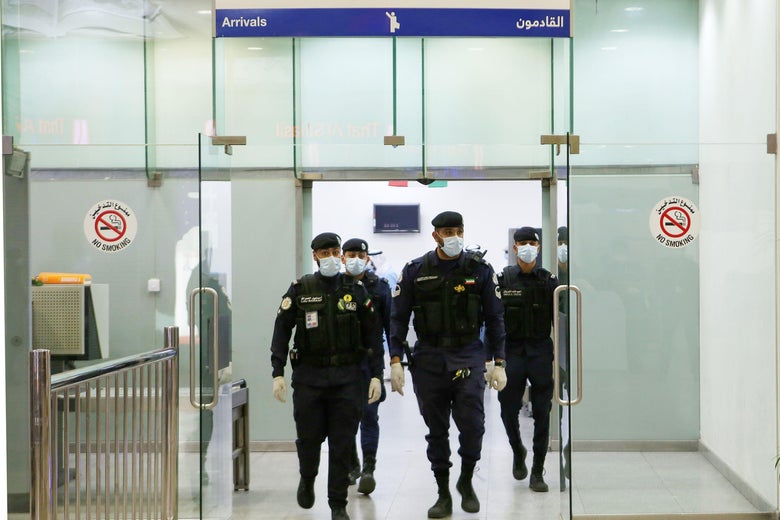
Kuwaiti policemen wearing protective masks wait at Sheikh Saad Airport in Kuwait City, on February 22, 2020, before transferring Kuwaitis arriving from Iran to a hospital to be tested for coronavirus.
YASSER AL-ZAYYAT/Getty Images
The White House is concerned about the possibility that there could be a large coronavirus outbreak in the United States that could sicken thousands and how that could affect the possibility of President Donald Trump being reelected. The increased concern comes as the World Health Organization is increasingly using more ominous language to refer to the new virus that suggests it is spreading more quickly and widely than previously realized and could be on the verge of reaching a pandemic.
A pandemic essentially refers to a stage in which epidemics break out in several countries—and even continents—at the same time. The new coronavirus that causes the disease that has been named covid-19 is on the verge of reaching that stage. The CDC is getting ready for that possibility as it prepares for the virus to start spreading much more quickly in the United States. “We’re not seeing community spread here in the United States, yet, but it’s very possible, even likely, that it may eventually happen,” Nancy Messonnier, director of the CDC’s National Center for Immunization and Respiratory Diseases, told reporters. “Our goal continues to be slowing the introduction of the virus into the U.S. This buys us more time to prepare communities for more cases and possibly sustained spread.”
The World Health Organization has not officially declared a pandemic yet but makes it sound like it’s pretty much inevitable. “The window of opportunity is still there, but the window of opportunity is narrowing,” WHO Director General Tedros Adhanom Ghebreyesus said on Friday. “We need to act quickly before it closes completely.”
Concern has grown particularly afer three countries have reported that untraceable coronavirus cells have emerged. Doctors have not been able to identify the source of outbreaks in South Korea, Singapore, and Iran. “A number of spot fires occurring around the world is a sign that things are ticking along, and what we are going to have here is probably a pandemic,” said Ian Mackay, a researcher at Australia’s University of Queensland.
In South Korea, 229 an additional cases were reported on Saturday, taking the total to 433 with three people dying from the virus. Iran, meanwhile, reported its fifth death from the virus with total cases numbering 28. In Italy, there have been 54 cases with two deaths. What seems particularly concerning about these new numbers is that many of these cases appear to have no direct link to travel to China. For now some 78,000 cases have been reported around the world across 29 countries and more than 2,300 have died. The WHO is particularly concerned about how quickly the virus could spread in countries with weak health systems, particularly in Africa.
In the White House, meanwhile, there is increased concern about what a pandemic could mean for the president’s chances of reelection. “The biggest current threat to the president’s reelection is this thing getting out of control and creating a health and economic impact,” said Chris Meekins, a Raymond James financial analyst. For now, only 34 cases have been confirmed in the United States, but that is a number everyone expects will grow. Even if the United States is spared from a huge outbreak though, the virus could still translate into economic risks since a pandemic “could slow global markets and upend a strong U.S. economy that has been central to Trump’s political pitch,” notes Politico.
Readers like you make our work possible. Help us continue to provide the reporting, commentary and criticism you won’t find anywhere else.
Join Slate Plusfrom Slate Magazine https://ift.tt/2HIMg9g
via IFTTT
沒有留言:
張貼留言